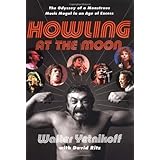
Average Reviews:

(More customer reviews)"There is the scum of the earth, and what lives under the scum of the earth, and under this we have music lawyers," fictional touring musician Vernon Shakely often remarked in Laurie Colwin's novel, "Goodbye Without Leaving."
Walter Yetnikoff might have been perversely proud to be included in the fictitious Shakely's asssessment of music industry lawyers. Unfortunately, his attempt to present himself as a formerly nice Jewish boy/Columbia Law grad turned baaaaaad example of Seventies excess keeps falling flat, despite the potential richness of material. Given that his co-author is the gifted David Ritz, whose other biography subjects include Marvin Gaye, B.B. King, and Aretha Franklin, one can only imagine how incoherent Yetnikoff's prose was before Ritz attempted to take it in hand. It appears that at some point, Ritz must have given up in despair.
The book begins with a detailed sexual fantasy about Jacqueline Kennedy Onassis ("Jack was a powerful lover, Ari was a passionate man, but you, Walter... you're nothing short of astounding," she cooes), followed by a suspiciously well-organized three-page "recollection" of a business luncheon Yetnikoff holds, just the two of them, at "21" with Mrs. Onassis. There she recaps his entire career in highly flattering terms, and urges him to write a "highbrow" memoir.
Well, poor Mrs. Onassis is dead and can't defend herself. But putting those words--if indeed she said them--into her mouth demonstrates the size of Yetnikoff's ego, which overwhelms what could have been a fascinating book. It is sort of fascinating, but for all the wrong reasons.
Yetnikoff was certainly in a position to drop names, and some of the anecdotes keep this book from being a total waste of time and energy, though the best bits already have been skimmed off by newspapers and magazines. He details, clearly and convincingly, Michael Jackson's manipulativeness, as well as his arrested development. Just prior to introducing Jackson to a black-tie party after his album "Thriller" sold 25 million copies, for example, Jackson whispered in Yetnikoff's ear, "I have to tinkle. Can you take me to the potty?"
There's also an engaging tale of a dinner with Bob Dylan and his mother, at which Mrs. Zimmerman urges "Bobby" to eat more, and asks, "And have you thanked Mr. Yetnikoff for this lovely dinner?"
However, more often Yetnikoff's tales of his business life with CBS/Columbia Records are disorganized, retaliatory, and peevish. He has a fatal weakness for rude nicknames: the Japanese executives at Sony, who acquired Yetnikoff's unit, are referred to repeatedly as "Happy Japs." In addition, he makes numerous homophobic remarks about legendary music executives who are--natch--much more famous than Yetnikoff.
Yetnikoff spends nearly as much time talking about women as dropping stars' names and talking business, the difference being that women comprise only the succinct, gutter-mouthed sum total of their physical attributes. His long-suffering first wife, June, ends up consoling Walter for his business reverses as she lay dying of cancer ("You'll be okay, Walter, I know you've got a lot on your mind but you'll be okay").
When he remarries, his second wife ("a pretty shiksa with big t*ts") gets less attention than Yetnikoff's snappy patter or the guest list--"Barbra attended. So did People magazine. So did Bruce Springsteen, Christie Brinkley, Mick Jagger, James Taylor"... as well as some industry cronies, one of whom "was mad that his table was too far in the back."
In short, Yetnikoff's sex life gets four lines and 31 references (some of which spread over two pages) in the index. His two sons merit three brief remarks and a tiny photo each.
The self-proclaimed "monstrous" excesses of his alcohol and drug use (23 references) come off as pretty dull in Yetnikoff's sweaty hands. When he offers cocaine to an Anglican vicar ("Wanna bump?"), what makes the anecdote is not the cocaine or the vicar, but the fact that this incident took place at James Taylor's wedding to Kathryn Walker at the Cathedral of St. John the Divine in Manhattan. I mean, he doesn't just get loaded, he gets loaded with NAMES, in snazzy locations, in an effort to show us how far he's come from his unhappy multifamily house in Brooklyn. The text doesn't improve when he discusses the harrowing process of recovery (22 mentions). He says he's been clean and sober since 1989, noting, "Sobriety has saved, or at least extended, my life. On some levels, I became a better person; on many levels, I became worse." By this point, near the end of the book, the weary reader can accept this point on faith.
On the subject of faith, rarely have I seen so many references to Jewishness by someone who doesn't appear to have touched a Torah since his bar mitzvah, which he poormouths as "a bust, a strictly low-rent affair." He refers to himself interchangeably as Walter and as Velvel, his Yiddish name, and at the end, when he Finds God, he refers to Him repeatedly as "Heshie." Isn't that just adorable? It made this Jewish reader wince.
"Howling at the Moon" ultimately leaves the reader unconvinced that Walter Yetnikoff has made any kind of journey except the inevitable aging process, and his move from New York to California. Rather than being a lovably louche bad boy, he's just bad. And he commits the raconteur's worst sin: He may have a few moments to share, but overall, he's boring.
Click Here to see more reviews about: Howling at the Moon: The Odyssey of a Monstrous Music Mogul in an Age of Excess

0 comments:
Post a Comment